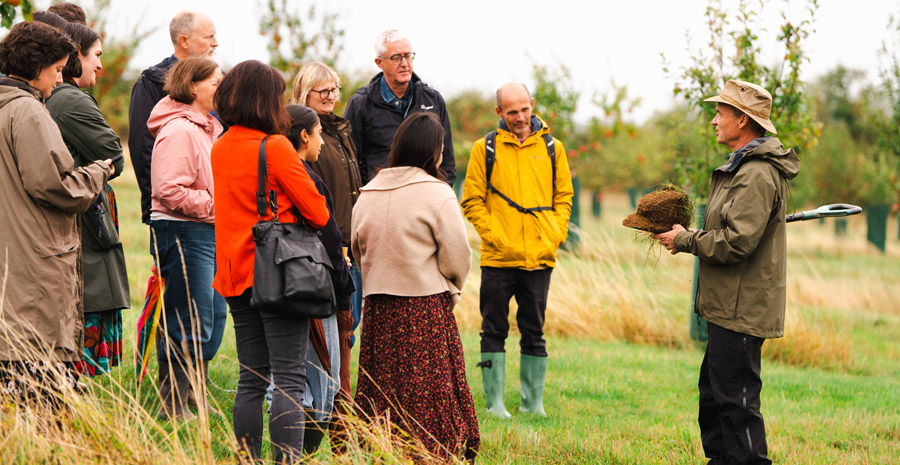Explore Honeydale Farm on an inspiring and informative guided farm walk, led by Founder, Ian Wilkinson or a member of the FarmED team.
Explore Honeydale Farm on an inspiring and informative guided farm walk, led by Founder, Ian Wilkinson or a member of the FarmED team.
Join us on the farm to discover which birds call FarmED their home over the winter!
In this interactive half-day workshop, we’ll explore the challenge of selecting, feeding and housing pastured poultry for meat and eggs in a high welfare and regenerative context.
In this half day workshop we will explore how pigs fit into a regenerative farming system and find out about issues concerning herd health in a pastured, outdoor system.
Explore Honeydale Farm on an inspiring and informative guided farm walk, led by Founder, Ian Wilkinson or a member of the FarmED team.
For people with little or no agricultural experience who are either entering a career in the rural sector or would like a basic knowledge of farming and food production.
Join the team from microbz to discuss the link between regenerated soils, nutrient dense food and gut health
How can beekeeping evolve from a fascinating hobby into a lucrative sideline, or even a full-time business?
Join us for an introduction to holistic planned grazing with expert Rob Havard
Discover the benefits of introducing herbal leys into your rotation with this one day course, and leave feeling confident in your abilities to plan and manage your own system.
Why do we need a new system of farming? Everyone is talking about ‘Regen Ag’ but what does it actually mean? How can you prove you’re farming regeneratively?
This one-day interactive workshop has been designed for anyone considering keeping bees, or on the verge of starting, and for those existing beekeepers interested in refreshing their knowledge.
Celebrate the Dawn Chorus with a torchlit farm walk, led by conservationist Nick Patel, followed by hot drinks and a light breakfast. This event has sold out for the past four years so book your ticket soon to avoid disappointment!
This one-day interactive workshop has been designed for anyone considering keeping bees, or on the verge of starting, and for those existing beekeepers interested in refreshing their knowledge.
Visit FarmED as part of Agroforestry Open Weekend 2026 for a brief taster of this system of growing food and trees together.
A day of ideas, inspiration and problem-solving for beekeepers. Designed for fledgling beekeepers and as a refresher for those who’re more experienced, this interactive course aims to look at how to manage the more complex aspects of beekeeping.
Bring your team
Looking for a venue to bring your whole team for an inspiring away day?
What does an away day at FarmED look like? Enjoy a fully facilitated day, hosted by one of our team, who will lead the conversation around farming, food and climate change. An away day on our beautiful Cotswold farm includes a nourishing and seasonal farm to fork lunch and delicious refreshments throughout your visit.
We can tailor any of our courses and events to suit the needs of your organistion. Please get in touch for more information.
Quick facts
...decrease in UK farmland bird species since 1970.
National Food Strategy, 2021.
...times more food is produced globally today, compared to 1960.
National Food Strategy, 2021.
...million hectares are farmed in the UK, made up of 200 thousand farm holding.
GOV.UK, 2021.
What happens at FarmED
Learning
Our FarmED team and other experts share their knowledge about regenerative farming, sustainability, food and biodiversity, from introductory level through to deeper dives.

Meeting
Join us at FarmED for your team away day, meeting or own event in our stunning Conference Barn or Library. We offer an inspiring and welcoming space for your team to enjoy their own bespoke experience.

Eating
Visit the FarmED Cafe to enjoy delicious, nourishing, seasonal food, fresh from the farm. Savour the stunning views over the Evenlode Valley and get a flavour of all that FarmED has to oer.

Bring your group for a bespoke experience
Contact us


